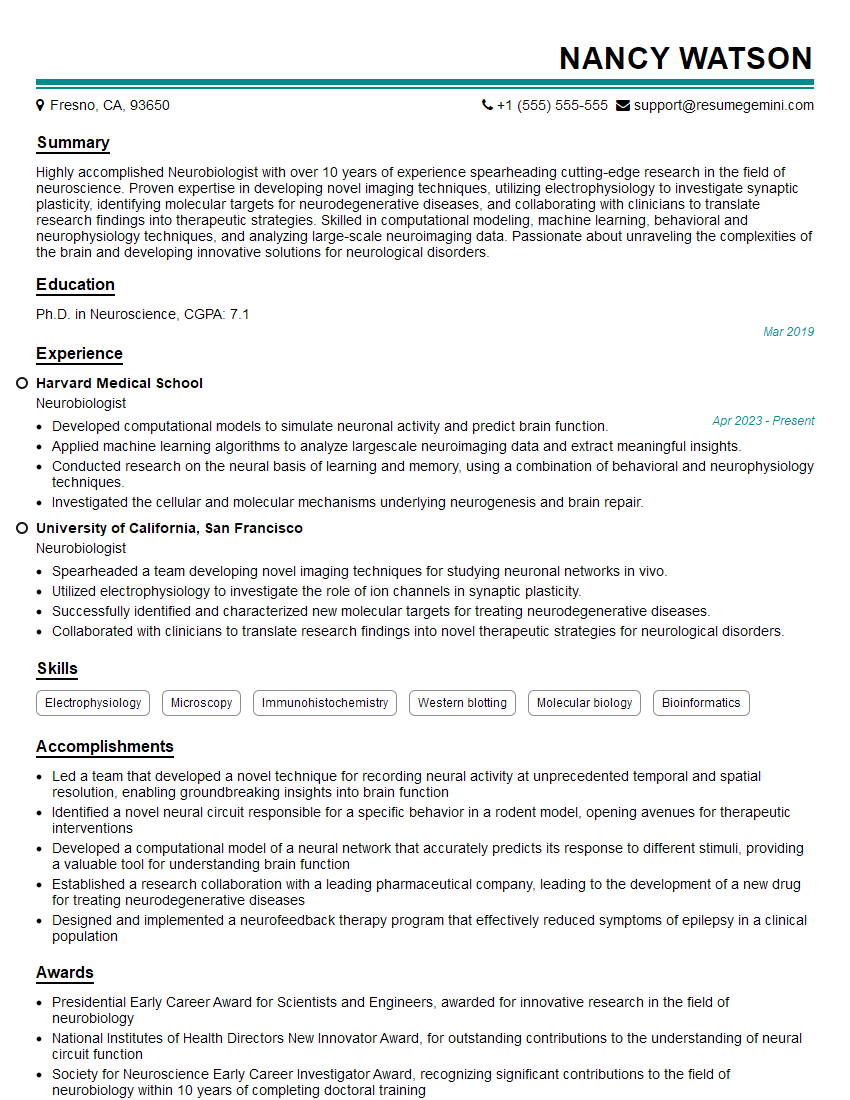Are you a seasoned Neurobiologist seeking a new career path? Discover our professionally built Neurobiologist Resume Template. This time-saving tool provides a solid foundation for your job search. Simply click “Edit Resume” to customize it with your unique experiences and achievements. Customize fonts and colors to match your personal style and increase your chances of landing your dream job. Explore more Resume Templates for additional options.

Nancy Watson
Neurobiologist
Summary
Highly accomplished Neurobiologist with over 10 years of experience spearheading cutting-edge research in the field of neuroscience. Proven expertise in developing novel imaging techniques, utilizing electrophysiology to investigate synaptic plasticity, identifying molecular targets for neurodegenerative diseases, and collaborating with clinicians to translate research findings into therapeutic strategies. Skilled in computational modeling, machine learning, behavioral and neurophysiology techniques, and analyzing large-scale neuroimaging data. Passionate about unraveling the complexities of the brain and developing innovative solutions for neurological disorders.
Education
Ph.D. in Neuroscience
March 2019
Skills
- Electrophysiology
- Microscopy
- Immunohistochemistry
- Western blotting
- Molecular biology
- Bioinformatics
Work Experience
Neurobiologist
- Developed computational models to simulate neuronal activity and predict brain function.
- Applied machine learning algorithms to analyze largescale neuroimaging data and extract meaningful insights.
- Conducted research on the neural basis of learning and memory, using a combination of behavioral and neurophysiology techniques.
- Investigated the cellular and molecular mechanisms underlying neurogenesis and brain repair.
Neurobiologist
- Spearheaded a team developing novel imaging techniques for studying neuronal networks in vivo.
- Utilized electrophysiology to investigate the role of ion channels in synaptic plasticity.
- Successfully identified and characterized new molecular targets for treating neurodegenerative diseases.
- Collaborated with clinicians to translate research findings into novel therapeutic strategies for neurological disorders.
Accomplishments
- Led a team that developed a novel technique for recording neural activity at unprecedented temporal and spatial resolution, enabling groundbreaking insights into brain function
- Identified a novel neural circuit responsible for a specific behavior in a rodent model, opening avenues for therapeutic interventions
- Developed a computational model of a neural network that accurately predicts its response to different stimuli, providing a valuable tool for understanding brain function
- Established a research collaboration with a leading pharmaceutical company, leading to the development of a new drug for treating neurodegenerative diseases
- Designed and implemented a neurofeedback therapy program that effectively reduced symptoms of epilepsy in a clinical population
Awards
- Presidential Early Career Award for Scientists and Engineers, awarded for innovative research in the field of neurobiology
- National Institutes of Health Directors New Innovator Award, for outstanding contributions to the understanding of neural circuit function
- Society for Neuroscience Early Career Investigator Award, recognizing significant contributions to the field of neurobiology within 10 years of completing doctoral training
- National Science Foundation CAREER Award, supporting research on the molecular basis of memory formation
Certificates
- Board Certified Neurologist (BCN)
- American Board of Psychiatry and Neurology (ABPN)
- Neuroimaging Postdoctoral Certificate
- Society for Neuroscience (SfN)
Career Expert Tips:
- Select the ideal resume template to showcase your professional experience effectively.
- Master the art of resume writing to highlight your unique qualifications and achievements.
- Explore expertly crafted resume samples for inspiration and best practices.
- Build your best resume for free this new year with ResumeGemini. Enjoy exclusive discounts on ATS optimized resume templates.
How To Write Resume For Neurobiologist
- Highlight your expertise in cutting-edge techniques such as electrophysiology, advanced microscopy, molecular biology, and computational modeling.
- Showcase your ability to work independently and as part of a team, and your strong communication and interpersonal skills.
- Quantify your accomplishments with specific metrics and outcomes whenever possible.
- Tailor your resume to each specific job description, emphasizing the skills and experiences that are most relevant to the position.
Essential Experience Highlights for a Strong Neurobiologist Resume
- Spearhead research projects investigating the neural basis of learning and memory, neurogenesis, and brain repair.
- Develop and implement novel imaging techniques for in vivo study of neuronal networks.
- Utilize electrophysiology to elucidate the role of ion channels in synaptic plasticity.
- Identify and characterize molecular targets for treating neurodegenerative diseases.
- Collaborate with clinicians to translate research findings into novel therapeutic strategies for neurological disorders.
- Develop computational models to simulate neuronal activity and predict brain function.
- Apply machine learning algorithms to analyze large-scale neuroimaging data and extract meaningful insights.
Frequently Asked Questions (FAQ’s) For Neurobiologist
What is the role of a Neurobiologist?
Neurobiologists study the structure and function of the nervous system, including the brain, spinal cord, and nerves. They investigate how the nervous system develops, how it functions, and how it is affected by injury or disease.
What are the educational requirements to become a Neurobiologist?
A Ph.D. in Neuroscience or a related field is typically required to become a Neurobiologist. Some Neurobiologists also have an M.D. degree.
What are the job prospects for Neurobiologists?
The job outlook for Neurobiologists is expected to be good over the next few years. This is due to the increasing prevalence of neurological disorders, such as Alzheimer’s disease and Parkinson’s disease, and the need for research into new treatments.
What are the key skills and qualities of a Neurobiologist?
Key skills and qualities of a Neurobiologist include strong analytical and problem-solving skills, excellent communication and interpersonal skills, and a passion for research.
What are the different career paths for Neurobiologists?
Neurobiologists can work in a variety of settings, including universities, hospitals, and research institutions. They can also work in the pharmaceutical industry or in government agencies.
What is the average salary for a Neurobiologist?
The average salary for a Neurobiologist is around $80,000 per year.